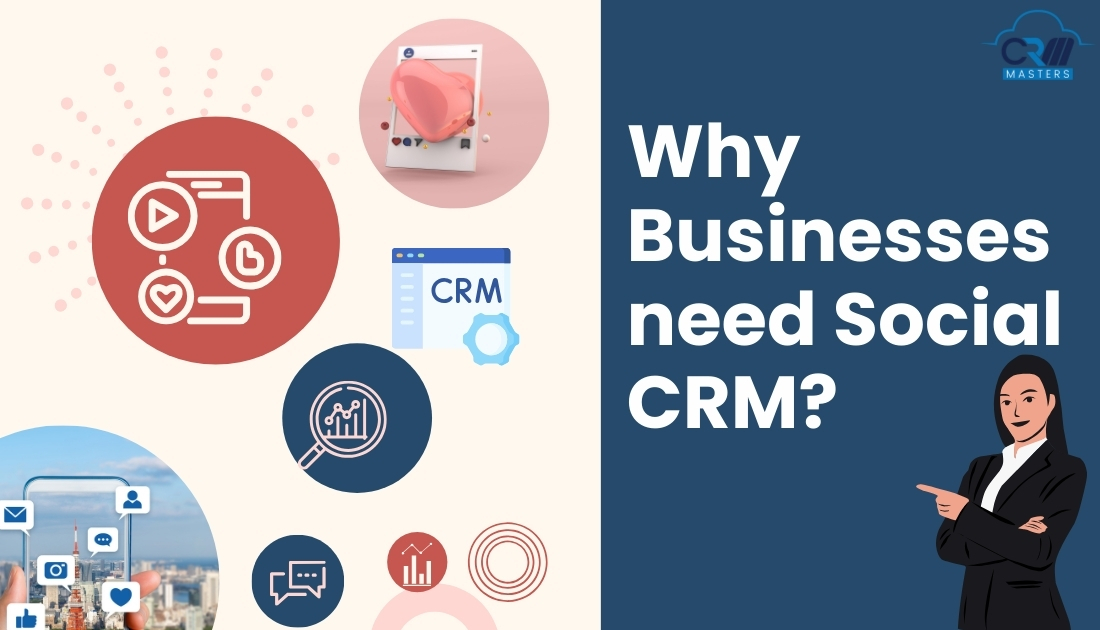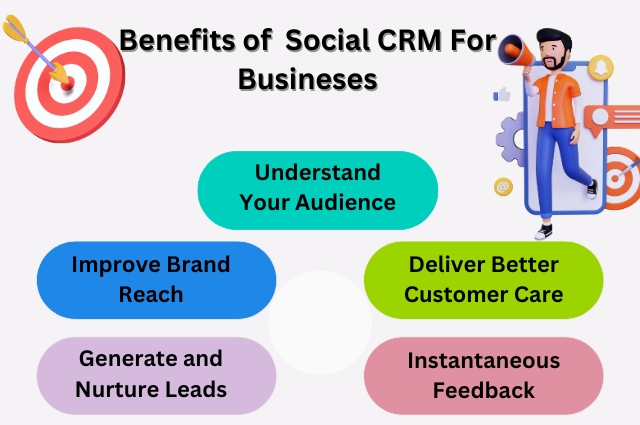
What Is Social CRM and Why Do Businesses Need It?
Social media allows businesses to interact directly with their customers in real-time. Every interaction has a story to tell and lessons to learn. However, without a social customer relationship management (CRM) tool, this information remains siloed within the marketing teams.
A well-designed social CRM can bring teams together around deeper customer insights, eliminating silos and enabling greater collaboration. In this blog post, we’ll dive into what social CRM is, what it can do for your business, and what tools you can leverage to improve your business through social insights.
What is Social CRM?
Social CRM, also known as Social customer relationship management (CRM), is a way of managing customer relationships that focuses on and emphasizes social media interactions, such as Facebook Twitter, LinkedIn, etc.
The benefits of social CRM are many but few are given below:-
- Provides faster customer service
- Integrates social, marketing, and customer service teams
- Control and improve your brand reputation
Social CRM enables businesses to collect valuable customer information and deliver tailored customer service experiences. Commonly, social CRM software will assist you in measuring the following:
-
Traffic:-
If you aim to increase traffic to your site or e-commerce channel, social CRM allows you to track traffic in real time as well as click-through rates so you can measure the success of conversion.
-
Brand Mentions:-
Social CRM allows you to monitor brand mentions across multiple channels.
-
Engagement Metrics:-
Customer Relationship Management (CRM) software for social platforms provides a breakdown of engagement metrics, including Likes, Shares, Reposts, Comments, and Incoming Communications.
Types of Social CRMs
A Social CRM combines traditional metrics with social media data to provide a 360-degree view of customer behavior. You can use a Social CRM to monitor when customers are engaging with your brands and on what social media platforms. There are two main kinds of social CRMs:
- Built-In Social CRM Functionalities:- A few CRMs already have social media features built-in. These features allow you to get notifications directly from your social accounts, so you can be kept up to date with messages and posts that are important to your business.
- Standalone Social CRM Software:- A CRM that doesn’t have any social media features built-in means you need to integrate with third-party software platforms to get access to social media features and insights within your CRM.
Traditional CRM vs Social CRM
A traditional CRM is mainly concerned with keeping track of customer information and interactions through traditional channels such as phone calls and email.
A social CRM is a CRM that includes social media. Social CRM enables brands to collect customer information from social media channels, keep track of conversations, and interact with customers more effectively.
Social CRM software allows teams to interact with customers in real-time. It also allows companies to provide personalized content — an easy way to strengthen your brand’s connection with your customers.
Benefits of Social CRM for Businesses
1. Empower your Support Team:-
Your CRM provides customer support agents with the data they need to quickly identify and resolve customer issues.
2. Understand Your Audience:-
Social CRM tools offer real-time insights into what drives your target audience. This data can be shared with your teams to provide your potential customers with a personalized and consistent experience.
3. Give Social Context to Your Interactions:-
The data collected from your social media customer relationship management (CRM) platform allows you to engage in meaningful conversations with your customers, which helps build a stronger relationship with them and makes your brand more human.
4. Instantaneous Feedback:-
Whether you like it or not, social media CRM allows you to get instant feedback from your audience. This allows you to make improvements to your products and services, and collect results without having to constantly search for feedback.
5. Improve Brand Reach and Perception:-
You can find brand supporters and influencers on social media and work with them to increase your reach and brand awareness.
6. Generate and Nurture Leads:-
With the right social media tools, you can help your sales and service teams and make sure they never miss a beat. Social CRM helps you generate leads, qualify leads, and nurture leads by making it easier for customer-facing teams to work together. For example, you could:
- Social teams build audiences for your ads based on past interactions across multiple touchpoints with your brand.
- Sales and marketing teams working together on all-channel ABM strategies, including personal social media profiles.
- Utilizing surface-level social listening to create moments of surprise and delight through proactive customer support.
7. Deliver Better Customer Care:-
You can’t provide excellent customer service if you don’t understand your customers. This is a problem that social and service teams have been dealing with for years. Without proper integrations, resolving customer issues on social channels is a one-way street for everyone involved.
Social CRM tools bridge this gap by collecting contextual information from a traditional CRM to drive social media engagement. This contextual information provides teams with the data they need to deliver high-quality customer service on a large scale.
Top Social CRM Software and Tools
The best social CRM software embeds social data at the core of your technology stack, feeding it with essential customer insights.
Find the solution that moves your business forward with our list of best social CRM tools:
Zoho CRM
Zoho’s CRM integrates seamlessly with major social platforms, has strong lead-generation features, and provides powerful analytics to help you make better decisions. Here are some of the advantages of using social with Zoho’s CRM:
- You can track and engage with social media platforms to gain insight and build relationships with prospects and customers.
- With social media CRM, you can set up roles and manage who has access to what.
- Gain insight into your brand’s social media presence through posts, comments, Likes, Tweets, Retweets, Messages, and mentions.
- Social media leads and contacts can be added to your Zoho Customer Relationship Management (CRM) account.
- Activity logs are a great way to keep track of all your CRM social media activities so you can review them whenever you need to.
- Manage and organize your social media information based on your business needs to reduce distractions and increase productivity.
Salesforce
Salesforce offers cutting-edge solutions like Social Studio and Community Cloud, facilitating comprehensive social media management and community building. With features like Einstein Analytics and seamless integration with the marketing cloud, Salesforce empowers businesses to harness the power of AI-driven insights and personalized marketing campaigns.
Also Read: How website conversion and customer support will add 2X revenue
Social CRM Challenges:-
1) Identifying Essential Information
With all the social media data available to you, it can be difficult to find the right information that is relevant and beneficial to your business. Ignoring the wrong data can cost your team valuable time and energy.
The ever-changing nature of social media, combined with evolving customer needs and preferences, means teams need to stay ahead of the curve and adjust to changing market conditions. To do this, you need to stay on top of the latest trends in social media and customer behavior.
2) Transforming Customer Data into Strategies
With so much social media data out there, it’s easy to get lost in the noise. That’s why it’s even more important to structure your customer data and create customer-centric strategies to make the most of your social media customer relationship management (CRM) platform.
3) Adapting your teams to changes
Social media trends are constantly changing with customer interests and needs. As a result, teams need to stay ahead of the curve and adjust to changing market conditions. This can be done by staying on top of social media and customer interactions.
4) Keeping up with new platforms and trends
With the ever-increasing number of social media platforms on the market, it can be difficult to keep up. Not only do you have to keep up with the ever-changing social media landscape, but it can also be difficult to stay on top of customer’s changing social habits across different platforms.
Conclusion
Social CRM is essential for businesses as it integrates social media data into customer interactions. This allows for personalized marketing, better customer service, and improved brand reputation management. In today’s digital age, leveraging Social CRM is crucial for businesses to stay competitive and build lasting relationships with their customers.
Facing Challenges in Social CRM?
CRM Master’s Infotech, Zoho Consulting Partner excels in providing the best Social CRM solutions. Reach out to us now for a personalized consultation and seamless integration.
Sweet Bonanza 1000 shining crown Shining Crown Chicky Run Sweet Bonanza 1000 Fortune Rabbit pusulabet













